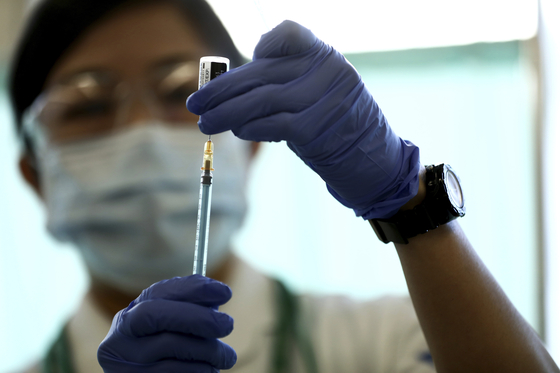In Japan, where Vaccination for Pfizer’s novel coronavirus infection (Corona 19) has begun on the 17th, it will be discussed how to receive the vaccine only once. There is growing concern that the supply schedule will be disrupted due to a global shortage of supplies.
Liberal Democratic Party’s Opinion of “Pfizer One-time Vaccination”
Only 800,000 Pfizers entered Japan
Schedule postponement is inevitable if shortage of supplies continues
“I can’t guarantee stability and effectiveness” The government is cautious
Prime Minister’s First Inoculation Theory
![On the 17th, medical staff at the Tokyo Medical Center in Japan are preparing for Pfizer's Corona 19 vaccine. [AP=연합뉴스]](https://i0.wp.com/pds.joins.com/news/component/htmlphoto_mmdata/202102/23/473c65ed-4b03-4ba9-b633-70a88b3c4827.jpg?w=560&ssl=1)
On the 17th, medical staff at the Tokyo Medical Center in Japan are preparing for Pfizer’s Corona 19 vaccine. [AP=연합뉴스]
According to Japanese media such as the Mainichi Newspaper on the 23rd, at the meeting of the ruling Liberal Democratic Party’s vaccine project team held on the previous day, considering the current situation where it is difficult to obtain a sufficient amount of vaccine, it was suggested to first review a plan to inoculate many people only once. Hakubun Shimomura, Chairman of the Liberal Democratic Party’s Jeongjo, said, “It requires political decisions, so let’s examine it within the party.”
The background of the discussion is the results of a recent study published by Israeli medical staff. Tel Aviv Shiva Medical Center in Israel, a country that has the fastest vaccination rate in the world, released a clinical result on the 18th that “a single dose of Pfizer’s vaccine has a preventive effect of 75-85%.” In clinical trials, Pfizer’s vaccine was found to be 95% effective when the second dose was given at 3 weeks intervals after the first dose.
Israeli medical staff tracked 7214 medical staff who received the first dose of the Pfizer vaccine in January, and found that the symptoms of COVID-19 infection decreased by 85% between 15 and 28 days after the first dose, and the prevention effect was 75% if asymptomatic cases were included. %. This content was published in the medical journal’Lancet’.
Japan is currently planning to start vaccinating 4.7 million medical staff in March and 36 million elderly people 65 years of age or older from April, but the actual vaccines are insufficient. About 800,000 doses (400,000 people) of the vaccine were delivered at the Pfizer plant in Europe in the second round, but the introduction schedule after the third round has not been set. Although 40,000 medical staff who are the top priority vaccination targets are sufficient, it is not possible to guarantee that the remaining medical staff will be vaccinated.
On the 21st, Taro Gono, the head of administrative reform in charge of the vaccine, appeared on NHK broadcasting on the 21st and said, “I want to start vaccination for the elderly over the age of 65 in April, but at the beginning, the quantity is bound to be limited.” Regarding the’one-time Pfizer vaccination plan’, he said, “If so, the vaccination method itself will be different. We will need to consult with the Ministry of Health, Labor and Welfare to consider it from now on.”
Earlier, the UK extended the interval between the first and second vaccinations to a maximum of 12 weeks, as it judged that the first vaccination alone would have a significant preventive effect. French health authorities recently announced the results that the vaccine effect is sufficient with just one dose if there is a history of corona 19 infection.
The Japanese government is still cautious about the’one dose vaccine’ plan. Since the Ministry of Health, Labor and Welfare approved the use on the basis of’two vaccinations every 3 weeks’, it is believed that a new approval process should be taken to reduce the number of vaccinations. Some voices question the credibility of Israeli clinical results.
Kato Katsunobu (加藤勝信) also showed a reserved attitude at a briefing on the 22nd, saying, “Can you definitely say that only one dose is enough. We have confirmed the safety and effectiveness on the premise of two doses.”
Meanwhile, Prime Minister Yoshihide Suga said at the National Assembly on the 22nd that he replied, “I will take the initiative when my turn comes according to the vaccination order determined by experts” to the point that “as a national leader, we must take the lead.” First of all, he made it clear that he was not willing to inoculate.
Tokyo = Correspondent Lee Young-hee [email protected]
